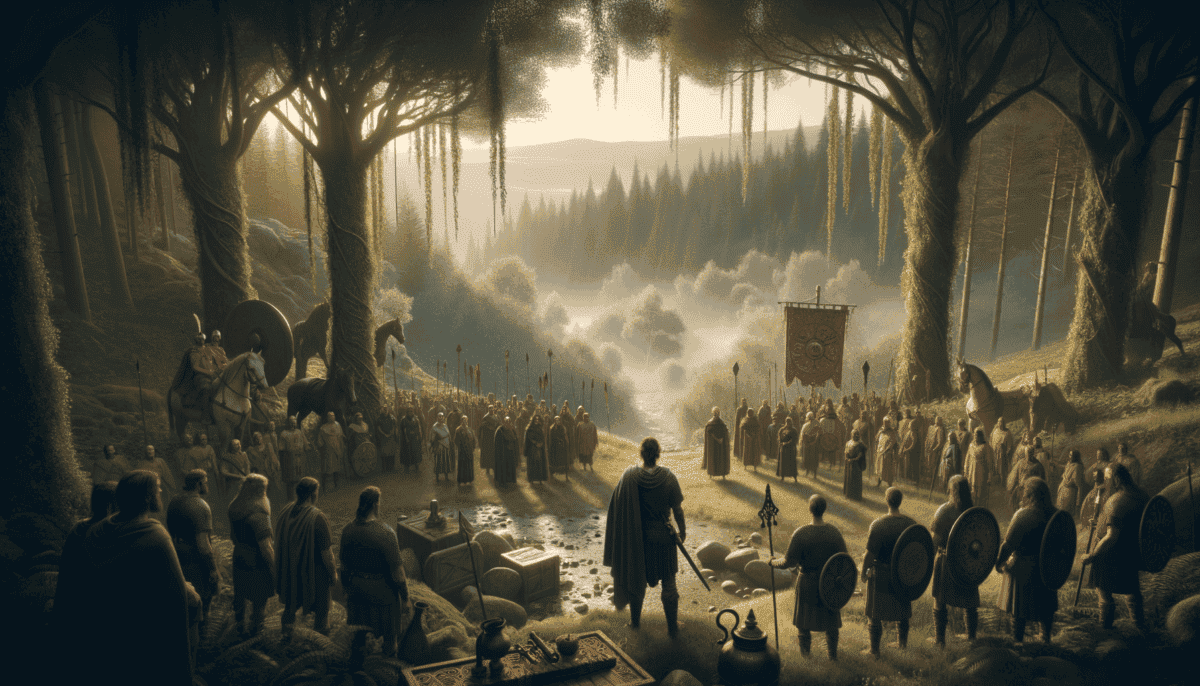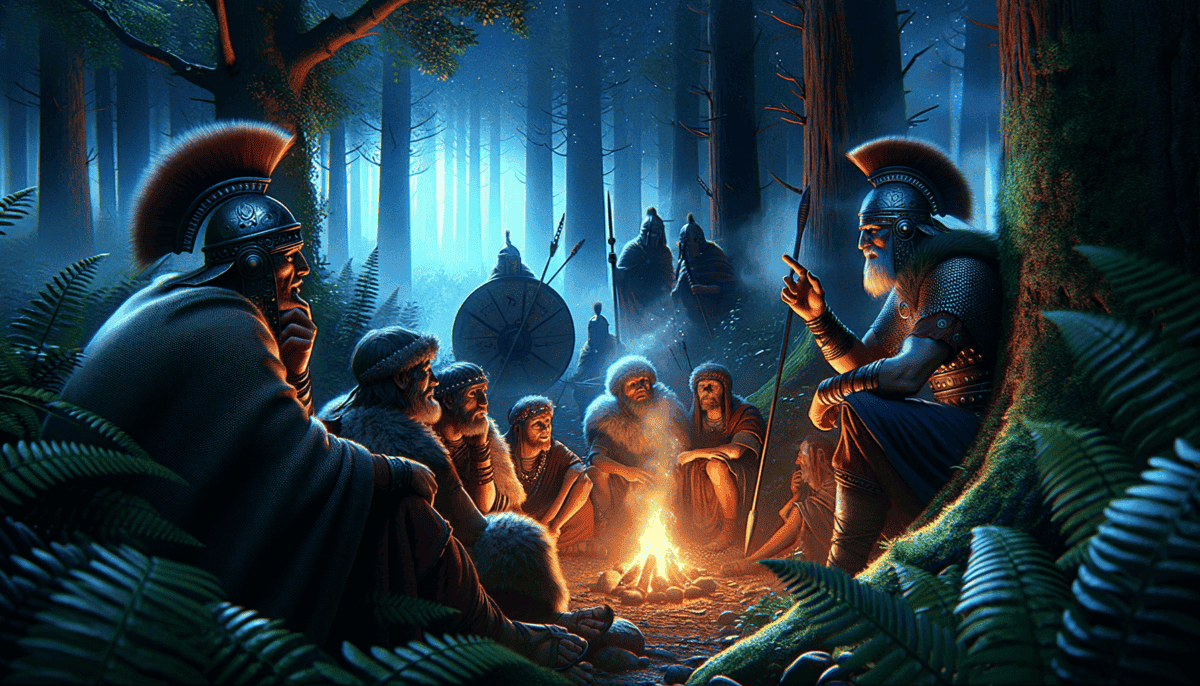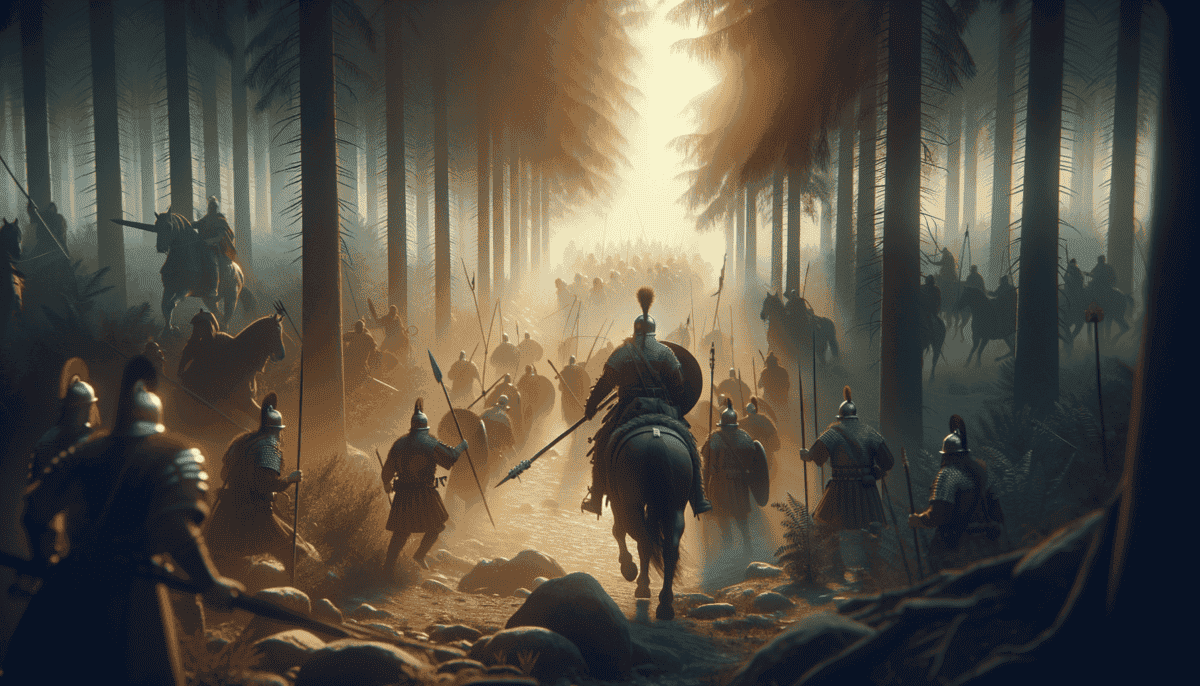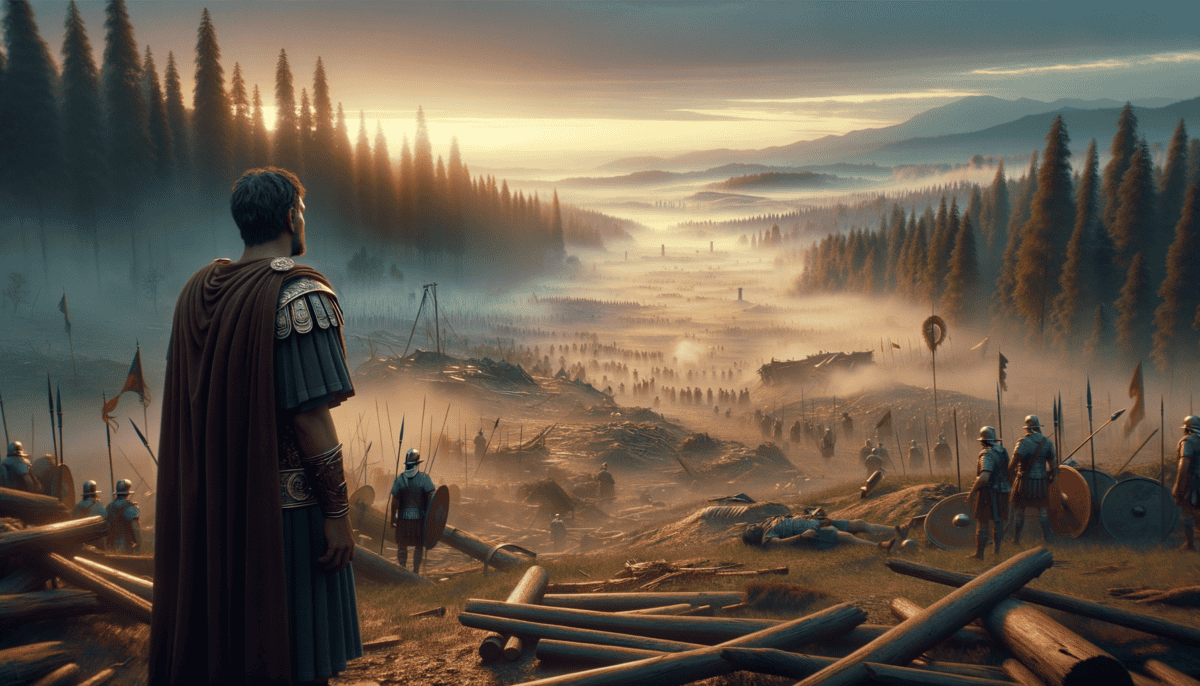The Young Hostage
The cold wind whistled through the dense German forest as young Arminius watched Roman soldiers approach his village. He was only seven years old, but he knew this day would change everything. His father, the chief of the Cherusci tribe, stood tall beside him.
"Be brave, my son," his father whispered, placing a warm hand on his shoulder. "Remember who you are."
The Roman commander, wearing a shiny red cape and golden armor, stepped forward. His boots made soft crunching sounds in the autumn leaves.
"Your son will receive the finest education in Rome," the commander said with a smile that didn't reach his eyes. "He will learn our ways and become a bridge between our peoples."
Arminius's heart beat fast like a drum. He knew what this meant – he would be a hostage, living far from his beloved forests and family. The Romans called it being an "honored guest," but even at his young age, he understood the truth.
The journey to Rome was long and strange. Arminius had never seen so many stone buildings or so many people in one place. Everything was different – the food, the clothes, even the way people talked.
"Stand straight, walk proud," his new Roman teacher told him. "You're going to be a proper Roman now."
Years passed like leaves falling from trees. Arminius grew tall and strong. He learned to speak Latin, to fight with a Roman sword, and to command soldiers. But at night, he dreamed of green forests and the songs of his people.
One day, while training in the Roman army, Arminius overheard two commanders talking:
"We'll need more soldiers to control those German tribes," one said.
"Yes, and that young German prince will help us. He's one of us now," the other replied with a laugh.
Something stirred in Arminius's heart – like a sleeping bear waking up. He looked at his Roman armor and thought about his real home, far away in the misty forests.
Was he really Roman now? Or was he still the son of the forest?
That night, Arminius made a big decision. He would use everything the Romans taught him, but not the way they expected. He would go home to his people, but he would take with him all the secrets he learned about Roman armies.
In his room, he carefully packed his things. His hand touched the small wooden bear his father had given him before he left – he had kept it hidden all these years.
"I know who I am now," he whispered to himself. "I am my father's son, and I will protect my people."
The next morning, Arminius told his Roman commanders he wanted to help them manage the German tribes. They were happy and proud of their "Roman-made" prince. But behind his careful smile, Arminius was already planning something they would never expect.
As he rode north toward his homeland, the wind felt different – it carried the smell of pine trees and freedom. His heart beat with excitement and fear. He wasn't just going home – he was going to change history.
⚡ His mind raced with plans and possibilities. The Romans had taught him everything about their army – how they fought, how they thought, and most importantly, how they could be beaten. Now he would use that knowledge to protect his people.
But first, he would have to convince everyone he was still loyal to Rome. It would be like playing a very dangerous game of hide and seek, where the prize was the freedom of his entire people.
Return to the Forest
The smell of pine needles and wet earth filled Arminius’s nose as he rode through his homeland. After fifteen years in Rome, everything looked smaller but felt bigger in his heart.
“Welcome home, son of Segimer,” called out a village elder. His voice cracked with emotion. “The forests have missed you.”
Arminius dismounted his horse, his Roman armor clinking. He saw how the villagers looked at his fancy clothes with mistrust. Some whispered behind their hands. He needed to show them he was still one of them.
“I may wear Roman cloth,” he announced, “but my heart beats with the rhythm of our drums.” He spoke in their language, which felt like honey on his tongue after so many years of Latin.
His father’s hall looked just as he remembered, though the great fire in the middle seemed smaller now. Warriors gathered around, their eyes curious and careful.
“Tell us of Rome,” one brave asked. “Are their walls really taller than trees?”
Arminius nodded. “Yes, but they fear our forests more than we fear their walls. That’s why they send more soldiers every year.”
The room grew quiet. Everyone knew about the new Roman camps being built on their lands. More taxes, more rules, more Roman ways pushing against their freedom.
“They think they can tame the forest,” Arminius said softly. “Like they tried to tame me.”
Over the next few days, Arminius visited other tribal leaders. He rode through hidden paths and secret valleys. At each stop, he shared meals and stories, building trust one conversation at a time.
“The Romans think I’m their friend,” he told a group of chiefs around a fire. “They trust me to help them control you. But I have a different plan.”
The chiefs leaned forward, their eyes reflecting the flames.
“United, we are stronger than Roman stone,” Arminius continued. “Divided, we will fall like autumn leaves.”
Some chiefs nodded, but others looked worried.
“How can we trust you?” asked one. “You wear their armor, speak their language.”
Arminius stood and removed his Roman cloak. Underneath, he wore a simple Germanic tunic he had kept all these years.
“I learned their ways to find their weaknesses,” he explained. “I know how they think, how they fight, and most importantly – how they can be beaten.”
The tribal leaders shared looks of interest. Hope began to spark in their eyes.
Meanwhile, Roman patrols passed through their lands, never suspecting that behind Arminius’s polite smiles, a plan was growing. Like a mighty oak from a tiny acorn, the idea of freedom was taking root.
Every night, Arminius met secretly with different tribal warriors. He taught them Roman battle signals and showed them how Roman soldiers moved in formation.
“See?” he demonstrated with sticks in the dirt. “They always march in straight lines. They expect flat battlefields. But we know every tree, every hill, every hidden path in our forests.”
Word spread quietly through the tribes like whispers in the wind. More chiefs came to listen, to learn, to plan. But they had to be careful – Roman spies were everywhere.
During the day, Arminius played his role perfectly. He greeted Roman officers with smooth words and helpful advice. “The tribes are peaceful,” he would report. “Everything is under control.”
But at night, under the protection of ancient trees and watchful stars, the real work continued. Warriors practiced new tactics, messengers carried secret plans between villages, and weapons were gathered and hidden.
The forest itself seemed to help keep their secrets. Fog appeared at just the right moments to hide meetings. Wolves howled to warn of approaching Romans. The very land seemed to understand that something big was coming.
Each passing day brought more tribes into their secret alliance. The Romans had tried to break them apart, but instead, they were coming together stronger than ever. Like separate streams joining to form a mighty river, the tribes were uniting under Arminius’s guidance.
As summer turned to autumn, Arminius knew they would soon be ready. The Romans would never expect their perfectly trained “friend” to turn against them. Their own teachings would become their greatest weakness.
Shadows and Secrets
The morning mist curled around Arminius’s boots as he walked through the Roman camp. His heart beat fast, but his face stayed calm. ️
“Ah, our trusted friend!” called Varus, the Roman commander. “What news from the tribes?”
Arminius bowed perfectly, just as he had learned in Rome. “All is peaceful, noble Varus. The tribes are… content.”
“Excellent!” Varus clapped him on the shoulder. “Rome has taught you well. You’re proof that these forests can be civilized.”
Arminius smiled, but inside his stomach felt tight. He watched Roman soldiers drill in their perfect lines. They looked so strong, but he knew their weakness – they couldn’t imagine being tricked by someone they thought was their friend. ️
Later that day, deep in the forest, Arminius met with tribal leaders in a hidden valley.
“The Romans plan to move their army soon,” he whispered. “They will march through the deep forest to their winter camp.”
An old chief leaned forward. “How many warriors?”
“Three full legions. Twenty thousand men.”
Gasps filled the air. No one had ever beaten such a large Roman army.
“But we have what they don’t,” Arminius said with a fierce smile. “We have the forest itself as our ally.”
He drew in the dirt with a stick, showing the Roman march route. “They trust me to guide them. Instead, I’ll lead them exactly where we want them.” ️
Over the next weeks, Arminius played a dangerous game. By day, he ate with Roman officers, shared their wine, and laughed at their jokes. By night, he met with more tribal leaders, building their secret army.
“Remember,” he told a group of warriors, “when the signal comes, every tribe must be ready. We will only have one chance.”
The warriors nodded, their eyes bright with purpose. They had been practicing the battle plans for months.
Arminius spent time teaching tribal scouts how Romans thought. “They expect attacks from the front,” he explained. “They never look up at the hills beside them.”
One young scout frowned. “But won’t they suspect something when so many tribes gather?”
“That’s why we gather in small groups,” Arminius answered. “Like raindrops joining to form a flood.”
Back at the Roman camp, Varus asked Arminius to dinner in his tent. The golden cups and fine food reminded him of his years in Rome.
“You’ve done wonderful work here,” Varus said. “Soon these forests will be as Roman as you are.”
Arminius raised his cup, hiding his true feelings behind a smile. If only Varus knew that every Roman lesson, every bit of trust, would soon be used against them.
The autumn leaves were turning red – blood red, some warriors whispered. Nature itself seemed to know what was coming. Soon the Romans would march, trusting their friend Arminius to guide them safely through the forest.
They didn’t know that every tree, every hill, every path had been carefully chosen. Like a hunter’s trap, everything was perfectly set. The greatest Roman army ever seen in Germania was about to walk right into it.
On the night before the Romans were to march, Arminius stood alone in the forest. The stars seemed especially bright through the branches above.
“Father Sky,” he whispered in his native tongue, “give us strength for what comes next.”
A wolf howled in the distance, and Arminius smiled. The forest was ready. His people were ready. Tomorrow would change everything.
The Forest’s Vengeance
Rain fell softly as the Roman army began their march. Three legions stretched like a giant snake through the dark forest. Their red cloaks were heavy with water. ️
Arminius rode beside Varus at the front. “This narrow path will take us safely through,” he said, pointing ahead.
The path grew smaller. Tall trees pressed close on both sides. Mud made the ground slippery. Roman soldiers struggled to keep their perfect lines.
“Something feels wrong,” muttered a Roman officer. But Varus waved away his worries.
“Nonsense! Arminius knows these woods better than anyone.”
High above, hidden in the trees and hills, Germanic warriors waited. Their hearts pounded with excitement. Arminius had taught them exactly what to do.
The signal was a bird call – but not just any bird. Arminius had chosen the eagle’s cry. A perfect joke: Rome’s own symbol would start their defeat.
When the Roman column was fully stretched out, unable to move quickly in the tight space, Arminius dropped back in the line. He looked up at the hidden warriors and nodded.
The eagle’s cry rang out!
Suddenly, chaos erupted everywhere!
Huge trees, cut nearly through, crashed down on the Romans. Spears and arrows rained from above. Germanic warriors charged from behind trees, shouting their war cries.
“Betrayal!” Varus screamed. “Arminius, help us!”
But Arminius had already torn off his Roman clothes. He wore his tribal warrior’s gear underneath. Standing tall on a hill, he led his people’s attack.
The Romans tried to fight back, but everything was wrong for them:
- Their shields were too heavy in the mud
- Their fancy armor got stuck on branches
- They couldn’t form their fighting lines in the narrow space
- The rain made their bows useless
“Keep pushing!” Arminius shouted to his warriors. “The forest fights with us!”
The battle lasted three terrible days. Romans fought bravely, but they were trapped. Each night, more soldiers slipped away into the dark forest – but Germanic warriors were waiting for them.
Varus knew it was over. “I have failed Rome,” he said sadly. Then he fell on his sword, just as Roman leaders did when they lost badly.
By the end, all three Roman legions were destroyed. Twenty thousand soldiers were gone. It was Rome’s worst defeat ever!
Arminius stood on a hill, watching the last flames die in the ruined Roman camp. His warriors were gathering weapons and armor from the battlefield.
“We did it,” said an old chief, standing beside him. “We showed Rome that our forests can’t be conquered.”
Arminius nodded slowly. He felt proud but also sad. He had needed to betray his Roman friends to save his people’s freedom. That would be a hard weight to carry.
A young warrior ran up excitedly. “The Romans will never come back after this!”
But Arminius knew better. “They will come,” he said quietly. “But now we know we can beat them. We know we are strong.”
That night, the tribes celebrated their great victory. Songs were sung about the battle. But Arminius walked alone in the quiet forest. The trees seemed to whisper to him: Well done, son of the forest. Well done.
News of the defeat raced to Rome. When Emperor Augustus heard about it, he was so upset that he banged his head on the walls and shouted: “Varus, give me back my legions!”
The battle changed everything. Rome never conquered the forests east of the Rhine River. The Germanic tribes stayed free – all because a young hostage remembered who he really was, deep in his heart.
The Price of Victory
The autumn winds carried the smell of smoke across the battlefield. Arminius stood at the edge of the Teutoburg Forest, watching his warriors collect Roman shields and swords. ️
“Three entire legions,” whispered Thorsten, an old tribal chief. “The mighty Rome bleeds after all.”
But victory had a price. Messages arrived daily from other tribal leaders. Some praised Arminius as a hero. Others worried about Rome’s anger.
“They say Emperor Augustus smashes his head against walls,” laughed a young warrior. “He keeps crying, ‘Varus, give me back my legions!'”
Arminius didn’t laugh. He knew Rome too well. “The emperor won’t forget this,” he said. “We must prepare.”
His words proved true. Soon, Roman scouts appeared at the forest edges. Behind them came new armies, led by Germanicus, Augustus’s nephew. ️
The tribes fought hard. This time, they faced a smarter enemy. Germanicus cut wide paths through the forests. He built roads where there were none.
“Let them come,” said Arminius to his worried people. “The deeper they march, the harder they’ll fall.”
But some tribal chiefs grew scared. They remembered Rome’s power. A few even started talking to Roman messengers in secret.
Arminius’s own family split apart. His brother Flavus, who still served Rome, sent him a message:
“Brother, you have woken a sleeping giant. Come back to Rome. The emperor might forgive you.”
Arminius’s answer was simple: “I’d rather die free than live as Rome’s pet.”
The fighting got worse. Germanicus attacked villages. Arminius led raids on Roman camps. Both sides lost many warriors. ⚔️
One day, Arminius found his wife Thusnelda crying. “What’s wrong?” he asked.
“My father,” she sobbed. “He… he gave me to the Romans. He thinks it will save his tribe.”
Arminius’s heart broke. His wife, carrying their unborn child, would be taken to Rome as a hostage – just like he had been so long ago.
Rage filled his heart. He wanted to attack her father’s village right away. But older chiefs stopped him:
“We can’t fight Romans AND each other,” they said. “The tribes must stay together!”
Some chiefs didn’t listen. They made deals with Rome. Others stayed loyal to Arminius. The great alliance that won at Teutoburg began falling apart.
Still, Arminius fought on. He led his warriors in clever attacks. They struck Roman camps at night. They trapped supply wagons in narrow valleys.
“As long as we stay free,” he told his people, “we win.”
Finally, after years of fighting, Rome gave up trying to conquer the eastern forests. The cost was too high. The tribes were too strong.
But victory had changed everything. Arminius watched his son grow up in stories told by Roman mothers. “Be good,” they told their children, “or Arminius will get you!”
At night, he would walk alone in the quiet forest. Sometimes he thought about his Roman friends who died at Teutoburg. Sometimes he wondered about Thusnelda and their child in Rome.
“Was it worth it?” the wind seemed to ask.
Looking at his free people, living by their own laws in their own forests, Arminius knew the answer. The price of freedom was high – but worth every drop of blood.
The Legend Lives On
Years passed like autumn leaves in the wind. Arminius, now older and wiser, stood on a hill overlooking the tribal lands. His gray hair danced in the breeze.
“Tell us the story again!” young children would beg, gathering around evening fires. “Tell us how you tricked the mighty Romans!”
Arminius smiled at their eager faces. “It wasn’t just me,” he always began. “It was all of us, together.”
The tribal lands had changed. Where Roman soldiers once marched, children now played. Trading routes connected the tribes. People shared stories, crafts, and songs.
“We learned something from Rome after all,” Arminius told the tribal council. “We learned how to be strong together.”
But dark clouds gathered too. Some tribal leaders grew jealous of Arminius’s fame. Others wanted his power.
“Make yourself king!” his friends urged. “The people will follow you.”
Arminius shook his head. “I fought for freedom, not a crown.”
One spring morning, messengers brought news from Rome. Emperor Tiberius had given up. The Roman armies would stay behind the great river Rhine.
“See?” Arminius told his warriors. “Even the mighty can learn!”
But victory’s price wasn’t done being paid. Enemies within the tribes plotted against Arminius. One dark night, they struck.
The great warrior fell, but his story didn’t end there. It grew bigger. ⭐
In Rome, writers told tales of the fierce German chief who changed history. In tribal lands, mothers sang songs about the boy who fooled an empire.
Centuries passed. The forests grew taller. New cities rose. But people remembered.
They built a giant statue of Arminius in Germany. It stands tall even today, reminding everyone of the warrior who loved freedom more than power.
Roman cities appeared along the Rhine river. But they weren’t built by conquerors anymore. They grew as trading places, where Roman and German cultures mixed freely.
And in those cities, something magical happened. Roman styles mixed with German ways. New ideas bloomed. Trade made everyone richer.
“See those Roman columns?” teachers now tell children. “And see those German roofs? That’s how two different peoples learned to be friends instead of enemies.”
In modern Germany, archaeologists still find treasures from those days:
- Roman coins mixed with German jewelry
- German pots with Roman designs
- Letters in both languages
- Tools that show how people shared ideas
The forest where Arminius won his great victory became a park. People from all over the world visit it. They read about the battle that changed history.
But the real treasure isn’t the old weapons or coins. It’s the lesson Arminius taught: Different peoples can learn from each other without losing who they are.
Today, children play in parks where armies once fought. They speak many languages and share many stories. Just like the Romans and Germans finally learned to do.
And sometimes, when the wind blows through the old forests, people say they can still hear Arminius’s words: “Be brave, be free, but most of all – be yourself.”
The young prince who became a hero showed us all: Sometimes the greatest victories aren’t won by swords, but by staying true to who you are.






